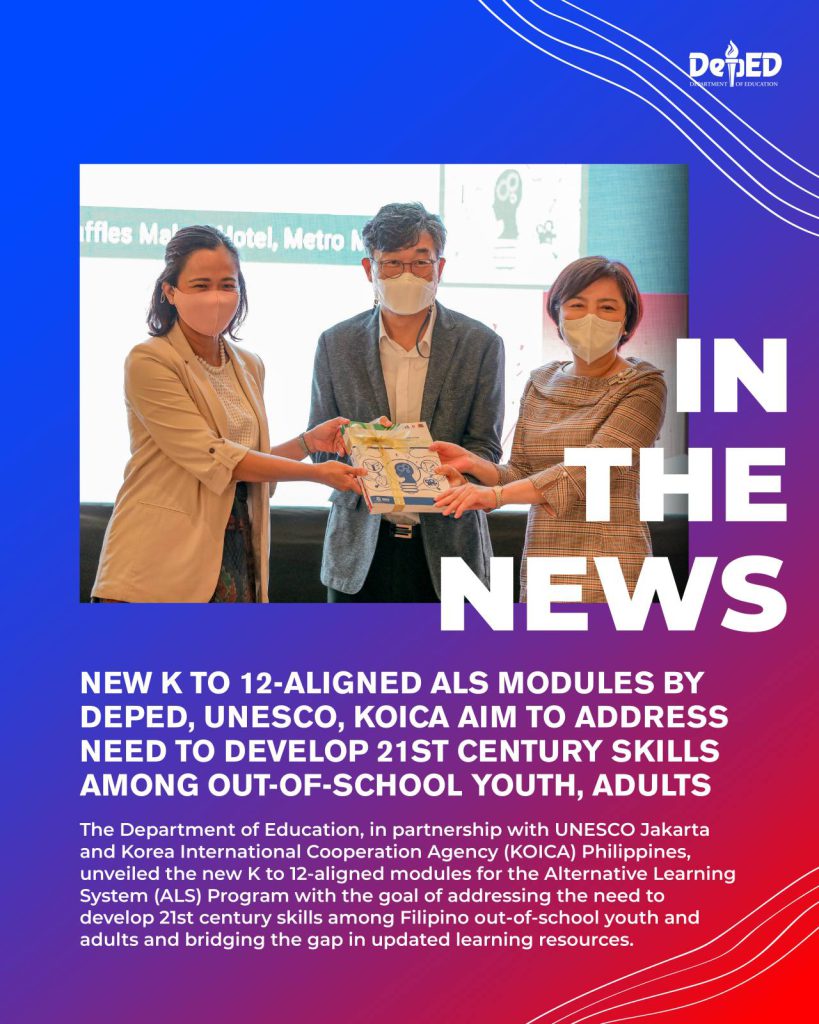 |
MAKATI CITY, May 2, 2022 – The Department of Education (DepEd), in partnership with UNESCO Jakarta and Korea International Cooperation Agency (KOICA) Philippines, last Friday, April 22, unveiled the new K to 12-aligned modules for the Alternative Learning System (ALS) Program with the goal of addressing the need to develop 21st century skills among its target learners – Filipino out-of-school youth and adults (OSYAs) – and bridging the gap in updated learning resources for the Program.
“In keeping with DepEd’s commitment to strengthen and intensify ALS, these new modules intend to aid the teaching and learning of 21st century skills that modules of the old ALS curriculum lack; this is another milestone not just for the Department but for our stakeholders as well,” Secretary Leonor Magtolis Briones said.
From 2019 to 2021, DepEd, through its Bureau of Alternative Education (BAE) and Bureau of Learning Resources (BLR), collaborated with UNESCO Jakarta, KOICA Philippines, and Asia Pacific College in the development and design of the new modules that cover the six learning strands under the enhanced ALS K to 12 Basic Education Curriculum: Communication Skills for English and Filipino (LS 1); Scientific and Critical Thinking Skills (LS 2); Mathematical and Problem Solving Skills (LS 3); Life and Career Skills (LS 4); Understanding the Self and Society (LS 5); and Digital Literacy (LS 6), which has been taught in the past years without the appropriate learning resources.
“We appreciate the support of KOICA and UNESCO Jakarta in this component of ALS. While the existing modules in the community learning centers (CLCs) can still be used, we will be most happy to see them [learners] acquire 21st century skills with updated learning resources, which will equip them when they pursue employment, or continue their education or training,” ALS Assistant Secretary G.H. Ambat stated.
Dr. Mee Young Choi, UNESCO Jakarta Education Unit Head, mentioned that “these newly developed modules do not only directly help a large number of target beneficiaries, but also serve as a concrete product of DepEd, KOICA, and UNESCO’s collaboration, especially in compliance with Republic Act 11510 or the ALS Act.”
Meanwhile, KOICA Philippines Country Director Kim Eunsub encouraged continuous efforts for the project toward realizing education inclusivity.
Contributing to the achievement of UN Sustainable Development Goals (SDGs), particularly UN SDG 4: Quality Education and Lifelong Learning in the Philippines, DepEd, UNESCO, and KOICA launched the project “Better Life for Out-of-School Girls to Fight Against Poverty and Injustice in the Philippines” in 2019, paving the way for the development of the modules.
According to ASec. Ambat, more than 3 million Junior High School ALS learners aged 15 to 24 are expected to benefit from the new modules comprised of ALS Teachers Guidebooks and ALS Students Workbooks.
END


